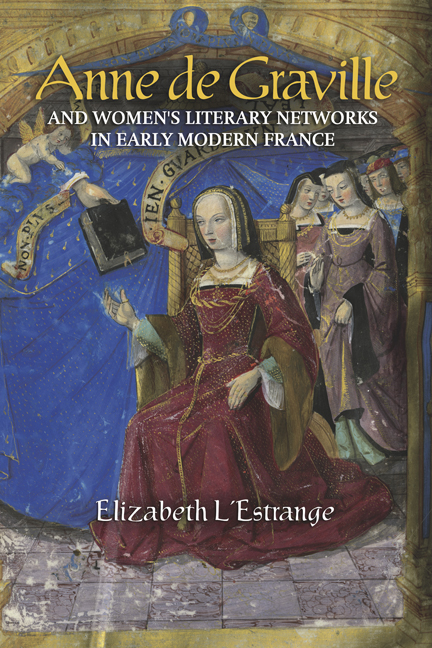Book contents
- Frontmatter
- Dedication
- Contents
- List of Illustrations
- Acknowledgements
- A Note on Citations, Translations and Transcriptions
- List of Abbreviations
- Map
- Introduction: ‘Une femme d’excellence en vertus, ma dame d’Entraigues’: Anne de Graville’s Life and Works
- PART I ANNE DE GRAVILLE: READER AND COLLECTOR
- PART II FROM READING TO WRITING: ANNE AS AUTHOR
- Conclusion: ‘Celle la qui porte le regnon’: A Last Word on Anne de Graville
- Appendix A Books Inherited, Acquired, Commissioned by or Associated with Anne de Graville
- Appendix B Inventory of the d’Urfé Library at La Bâtie, c. 1780
- Appendix C Manuscripts Containing Works by Anne de Graville
- Bibliography
- Index
- Gallica
5 - Love, Amazons and Fortune in the Beau roman for Claude of France
Published online by Cambridge University Press: 11 January 2024
- Frontmatter
- Dedication
- Contents
- List of Illustrations
- Acknowledgements
- A Note on Citations, Translations and Transcriptions
- List of Abbreviations
- Map
- Introduction: ‘Une femme d’excellence en vertus, ma dame d’Entraigues’: Anne de Graville’s Life and Works
- PART I ANNE DE GRAVILLE: READER AND COLLECTOR
- PART II FROM READING TO WRITING: ANNE AS AUTHOR
- Conclusion: ‘Celle la qui porte le regnon’: A Last Word on Anne de Graville
- Appendix A Books Inherited, Acquired, Commissioned by or Associated with Anne de Graville
- Appendix B Inventory of the d’Urfé Library at La Bâtie, c. 1780
- Appendix C Manuscripts Containing Works by Anne de Graville
- Bibliography
- Index
- Gallica
Summary
Claude of France, to whom Anne de Graville dedicated her Beau roman, was born in 1499 to Anne of Brittany and Louis XII. Her marriage to the future Francis I in 1515 had been engineered by Louis and by Francis's mother, Louise of Savoy, against the wishes of Anne of Brittany, who had hoped that an alternative union would ensure the independence of the duchy of Brittany from the Crown. Despite a short life, lived – as historiography would have us believe – away from the political limelight, Claude has recently been shown to have played an important part in the cultural life of the court, having received a thorough religious and humanist education at her mother's instigation. In his Soulas de Noblesse sus le coronnement de la Royne de France Claude, addressed to the queen in 1518, a few years before the Beau roman, Guillaume Michel wrote:
Cronis, qu’on dict deesse des croniques,
De grand sçavoir et hystoires publicques,
Te logera et choisira ta place
Bien haultement au livre de Bocace:
Lequel contient en sa rescription
L’honneur, l’estat, et la cantation
Des dames lors qui furent sans diffemmes,
Intitulé ‘Des nobles cleres femmes’.
Cronis, who is said to be the goddess of chronicles
Of great learning and well-known stories
Will find a place to house you
High up in the book of Boccaccio,
Which relates, in its translation,
The honour, estate and the recitations
Of ladies who were without blame at that time
[And is] entitled ‘Des nobles cleres femmes’.
Despite the problematic nature of the praise Boccaccio offered to women in De mulieribus claris, Michel's text associated Claude with an important literary tradition and was intended to highlight her honour and blamelessness. It followed similar associations between Anne of Brittany and the women of De mulieribusin the anonymous translation dedicated to the queen in 1493 and reinforced a decade or so later in Dufour's Vie des femmes celebres. Claude's commissioning of a new version of the Livre de Thezeois an important source of information about the queen that must be situated in relation to this close association between French aristocratic women and the querelle des femmes.
- Type
- Chapter
- Information
- Publisher: Boydell & BrewerPrint publication year: 2023



